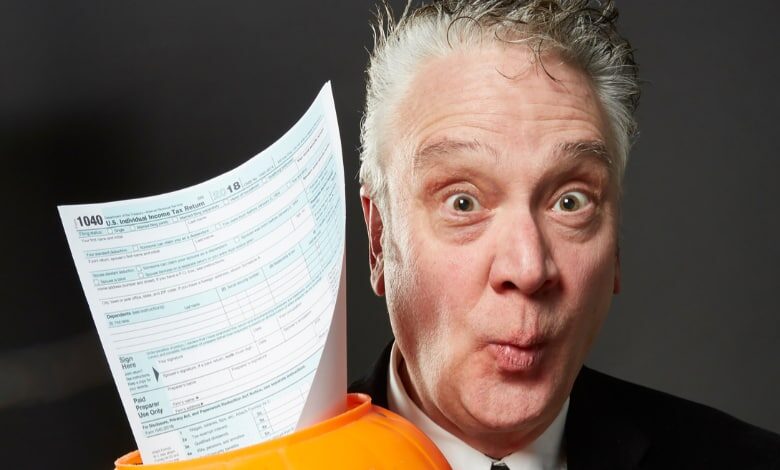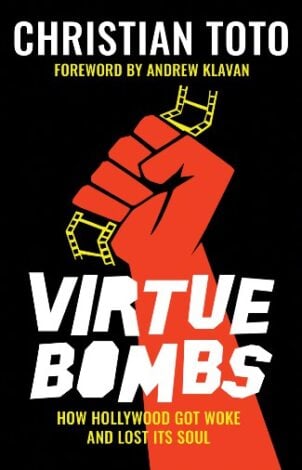Here’s How Comedian Tim Slagle Stares Down Cancel Culture
Veteran stand up brings his right-leaning wit to Dry Bar Comedy's mega platform

Comedian Tim Slagle takes a “glass half full” approach to Cancel Culture.
The Detroit native, a cut-up with four decades of experience behind the mic, thinks the cultural scourge makes comedy clubs even more vital than before.
Assuming they don’t cancel a performer first.
Slagle, who co-hosts two different podcasts (“Rule of Three” and “Another Day Above Ground”), shouldn’t have any trouble with the woke mob following his most recent gig. His visit to the Utah-based Dry Bar Comedy stage showcased his inimitable wit and ability to work squeaky clean.
Dry Bar Comedy proved a snug fit for Slagle, a veteran of MTV’s “Half Hour Comedy Hour” and Fox News’ “Red Eye,” among many media appearances. He opened up to HiT about telling “clean” jokes, the risks of ignoring your age and the upside to Cancel Culture.
Note: Users who use the “timslagle” promo code when downloading the Dry Bar + app get a free subscription for a month.
HiT: Dry Bar comedy has racked up some big numbers since its inception (including more than a billion views across platforms). What do you see as the secret to the platform’s success?
Tim Slagle: I think they’ve discovered a niche that’s been ignored by the comedy industry. People with conservative values still enjoy laughing, and they’re not stupid. Dry Bar fills that void without treating them like little children.
Growing up, I got turned on to stand up comedy by watching comedians appear on talk shows. It was always my favorite part of any show. Back then, the entire family could watch the comedian and laugh together. I think that’s something we’ve lost.
With so may screens in every household, I imagine there is very little time these days the family still watches shows together. But at least with a Dry Bar subscription, parents don’t have to worry about what their kids are laughing at up in their room.
HiT: How much did you have to tweak your act to fit into the Dry Bar template (clean, presumably apolitical, etc)?
Slagle: My stuff is pretty political, though not overtly. So I really didn’t have to take much of the politics out. I’m also a pretty clean act to begin with, so all I had to do is tidy up the language. Words like “Hell” are so commonplace in conversation today, that I forget some people still consider it a curse.
You also can’t make jokes about drinking, or doing drugs or other sinful activities. That makes it somewhat difficult since almost every joke has a basis in one of the deadly sins.
RELATED: How Big Tech Is Crushing Conservative Comedy
A lot of comedians don’t like the restrictions, and I understand their perspective. Our industry is rooted in the right to uncensored speech. (At least, it used to be.)
Myself, I rather enjoy working clean, since it lets the more subtle jokes come through without getting buried in the noise. It’s like getting to use pastels when the majority of artists paint with primary colors.
HiT: Clean comedy was once a negative phrase, assuming the jokes were family-friendly but less than hilarious. Dry Bar Comedy is helping to change that thinking — thoughts?

Slagle: There is a stigma that a G rating means it’s geared toward a juvenile mindset. (I think “Hee-Haw” suffered from that stigma — deservedly.) But there’s a group of comedians who have been working the mega church circuit for years, playing to packed houses. These comics play to adult audiences, without pandering or talking down to them. Dry Bar has really tapped into that market.
I think it’s been really good for me, since conservative people also tend to be politically conservative.
HiT: You lean into being older during the set … do you find that material cathartic, and do you worry you could ‘lose’ younger audiences in the process?
Slagle: As a comedian, it’s my job to point out the obvious. There is no hiding that I started doing comedy in the previous century. Unless they really appreciate the art of comedy, kids aren’t going to find me funny anyway. If I tried to speak in their language it would come off as silly.
I still remember shows like “Laugh-In,” when 50-year-old men would put on a wig and a fur vest to do a “hippie” character. It always came off as false and stupid.
HiT: The set isn’t conservative, but you tweak a few topics that a liberal comedian might avoid. Do you find poking fun at student loan forgiveness and taxation, for example, gets a different response from audiences? How so?
Slagle: Sure. if I’m working in front of a lot of college students, there’s going to be some resistance. But if I’m working a Country Club, the audience gets it. At this the point in time, even vaccines have become politicized, so it’s nearly impossible to avoid.
I do one line about how to get an American on the other end of the line when you’re talking to a call center. When I do it in the clubs, the earlier audiences, who tend to be older, laugh really hard at it. When I do it at the late shows, that skew younger, they just stare.
HiT: Years ago getting on Carson or Letterman was a sign a comedian had ‘made it.’ Now, snagging a viral video or Dry Bar spotlight can make a difference to a stand-up’s career. How else has stand-up changed, in your view … and has that been for the better, worse or a little of both?
Slagle: It’s funny you mention that. Going into the taping, another comic told me that a Dry Bar special is as good as a “Tonight Show” set was back in the era of Carson. I don’t know if it’s true on that scale, but I think Dry Bar specials do a lot more for someone’s career than a “Tonight Show” does these days. Your average “Tonight Show” gets about 300,00O viewers. Dry Bar Specials count their viewership in tens of millions.
I think it’s good, because comedians no longer have to struggle in big cities they can’t afford to live in, doing sets for next to nothing, hoping that a scout from one of those shows will catch their set.
Dry Bar has really opened up a lot of opportunities for comics in flyover country. We can actually make a living touring the circuit, and live affordably.
HiT: I’m sure you’ve followed the Dave Chappelle situation and Cancel Culture in general … is there anything fresh or important we’re missing about this cultural debate?
Slagle: I think Cancel Culture will be great for the comedy clubs (at least the ones that don’t buy into it). The comedy club stage is the last 10 square feet of real estate that the Correctniks don’t own. It’s the spot where anything can be said.
More comics are demanding that cell phones be bagged and disabled before shows, and that is going to be mystery and allure connected with live comedy performances.
We now passed our third summer without a breakaway hit comedy movie. And I think you can pin that on the Correctniks. They’ve effectively destroyed comedy movies. I think networks aren’t doing comedy anymore either.
So as Cancel Culture progresses, the clubs will be only one place you can go for a good laugh.
